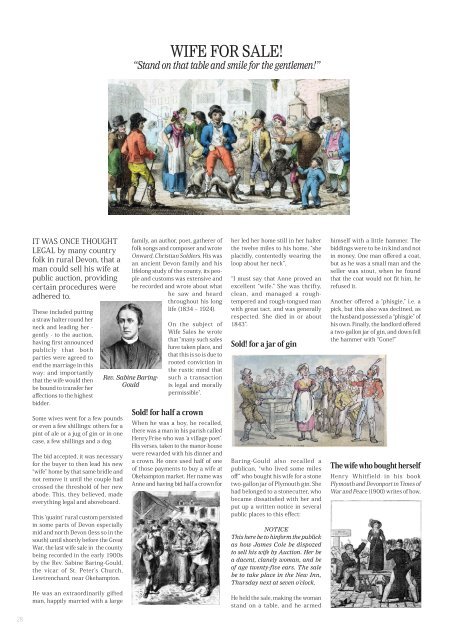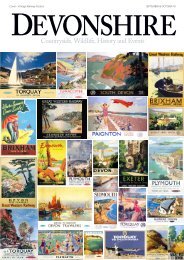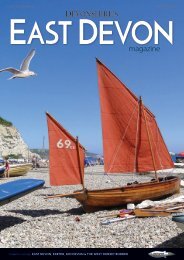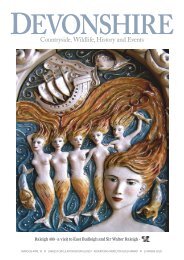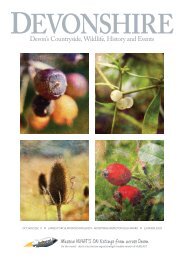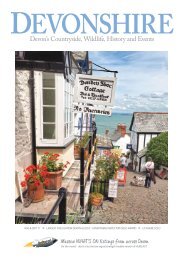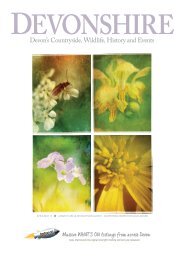Devonshire January February 19
Create successful ePaper yourself
Turn your PDF publications into a flip-book with our unique Google optimized e-Paper software.
WIFE FOR SALE!<br />
“Stand on that table and smile for the gentlemen!”<br />
IT WAS ONCE THOUGHT<br />
LEGAL by many country<br />
folk in rural Devon, that a<br />
man could sell his wife at<br />
public auction, providing<br />
certain procedures were<br />
adhered to.<br />
These included putting<br />
a straw halter round her<br />
neck and leading her -<br />
gently - to the auction,<br />
having first announced<br />
publicly that both<br />
parties were agreed to<br />
end the marriage in this<br />
way: and importantly<br />
that the wife would then<br />
be bound to transfer her<br />
affections to the highest<br />
bidder.<br />
Some wives went for a few pounds<br />
or even a few shillings: others for a<br />
pint of ale or a jug of gin or in one<br />
case, a few shillings and a dog.<br />
The bid accepted, it was necessary<br />
for the buyer to then lead his new<br />
“wife” home by that same bridle and<br />
not remove it until the couple had<br />
crossed the threshold of her new<br />
abode. This, they believed, made<br />
everything legal and aboveboard.<br />
This ‘quaint’ rural custom persisted<br />
in some parts of Devon especially<br />
mid and north Devon (less so in the<br />
south) until shortly before the Great<br />
War, the last wife sale in the county<br />
being recorded in the early <strong>19</strong>00s<br />
by the Rev. Sabine Baring-Gould,<br />
the vicar of St. Peter’s Church,<br />
Lewtrenchard, near Okehampton.<br />
He was an extraordinarily gifted<br />
man, happily married with a large<br />
family, an author, poet, gatherer of<br />
folk songs and composer and wrote<br />
Onward, Christian Soldiers. His was<br />
an ancient Devon family and his<br />
lifelong study of the county, its people<br />
and customs was extensive and<br />
he recorded and wrote about what<br />
he saw and heard<br />
throughout his long<br />
life (1834 ‒ <strong>19</strong>24).<br />
Rev. Sabine Baring-<br />
Gould<br />
On the subject of<br />
Wife Sales he wrote<br />
that “many such sales<br />
have taken place, and<br />
that this is so is due to<br />
rooted conviction in<br />
the rustic mind that<br />
such a transaction<br />
is legal and morally<br />
permissible”.<br />
Sold! for half a crown<br />
When he was a boy, he recalled,<br />
there was a man in his parish called<br />
Henry Frise who was ‘a village poet’.<br />
His verses, taken to the manor-house<br />
were rewarded with his dinner and<br />
a crown. He once used half of one<br />
of those payments to buy a wife at<br />
Okehampton market. Her name was<br />
Anne and having bid half a crown for<br />
her led her home still in her halter<br />
the twelve miles to his home, “she<br />
placidly, contentedly wearing the<br />
loop about her neck”.<br />
“I must say that Anne proved an<br />
excellent “wife.” She was thrifty,<br />
clean, and managed a roughtempered<br />
and rough-tongued man<br />
with great tact, and was generally<br />
respected. She died in or about<br />
1843”.<br />
Sold! for a jar of gin<br />
Baring-Gould also recalled a<br />
publican, “who lived some miles<br />
off” who bought his wife for a stone<br />
two-gallon jar of Plymouth gin. She<br />
had belonged to a stonecutter, who<br />
became dissatisfied with her and<br />
put up a written notice in several<br />
public places to this effect:<br />
NOTICE<br />
This here be to hinform the publick<br />
as how James Cole be dispozed<br />
to sell his wife by Auction. Her be<br />
a dacent, clanely woman, and be<br />
of age twenty-five ears. The sale<br />
be to take place in the New Inn,<br />
Thursday next at seven o’clock.<br />
He held the sale, making the woman<br />
stand on a table, and he armed<br />
himself with a little hammer. The<br />
biddings were to be in kind and not<br />
in money. One man offered a coat,<br />
but as he was a small man and the<br />
seller was stout, when he found<br />
that the coat would not fit him, he<br />
refused it.<br />
Another offered a “phisgie,” i.e. a<br />
pick, but this also was declined, as<br />
the husband possessed a “phisgie” of<br />
his own. Finally, the landlord offered<br />
a two-gallon jar of gin, and down fell<br />
the hammer with “Gone!”<br />
The wife who bought herself<br />
Henry Whitfield in his book<br />
Plymouth and Devonport in Times of<br />
War and Peace (<strong>19</strong>00) writes of how,<br />
28


